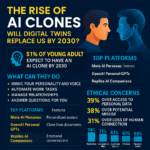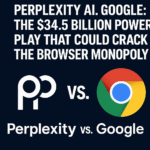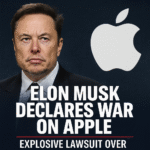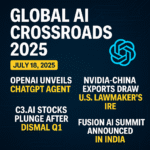Now Reading: Elon Musk Declares War on Apple: Explosive Lawsuit Over App Store Manipulation Favoring ChatGPT and Sabotaging Grok
-
01
Elon Musk Declares War on Apple: Explosive Lawsuit Over App Store Manipulation Favoring ChatGPT and Sabotaging Grok
Elon Musk Declares War on Apple: Explosive Lawsuit Over App Store Manipulation Favoring ChatGPT and Sabotaging Grok

Elon Musk Declares War on Apple: Explosive Lawsuit Over App Store Manipulation Favoring ChatGPT and Sabotaging Grok
Chapter I – The Storm Breaks: Musk Shatters the Silence and Opens Fire on Apple
In a technological landscape dominated by discreet alliances, algorithmic monopolies, and a corporate culture of opacity where the end user has virtually no control over how information is served, Elon Musk has chosen to upend the table and open a direct conflict with one of the industry’s most powerful actors — Apple.
The legal action he has launched is not a mere commercial complaint but a declaration of war against algorithmic monopoly, a publicly staged fight in which Musk assumes the role of the whistleblower exposing a manipulation mechanism hidden behind the façade of technological neutrality.
The announcement came during a live event streamed on X — the platform formerly known as Twitter — which, under Musk’s leadership, has become not just a space for rapid communication but also a battlefield of ideological resistance against digital censorship. In a tone that was calculated yet loaded with gravity, Musk revealed that X AI had officially filed a lawsuit against Apple, accusing the company of systematic manipulation of App Store ranking algorithms to keep ChatGPT locked in the dominant #1 position while Grok, Musk’s AI, was intentionally pushed down the charts.
Musk’s words carried the weight of an indictment:
“This isn’t about a free market; it’s about a digital regime where the algorithm decides what you’re allowed to see and hides the alternatives. And if you don’t fight such a regime, you become part of it.”
The statement detonated like a political bomb in Silicon Valley, turning a long-simmering tension into a frontal confrontation with global economic, technological, and political stakes.
Chapter II – Anatomy of the Accusation: How a Global Ranking Gets Rigged
To the average user, App Store rankings appear to be the fair outcome of a neutral algorithm, reflecting only download counts and user ratings. The reality, however, is far murkier. According to internal documents obtained by Musk’s legal team, the ranking system is driven by a complex set of invisible parameters: “retention rate,” “daily engagement,” “premium user preference,” and even subjective factors such as “strategic relevance” and “content policy compliance.”
Musk alleges that Apple deliberately manipulated these factors, giving ChatGPT a massive artificial advantage in the categories that weigh most heavily in rankings, while penalizing Grok based on “elastic criteria” — such as its engagement with sensitive topics or its “non-compliant” tone — even though independent traffic data shows Grok outperforming ChatGPT in retention and per-user interaction.
Evidence submitted in court reportedly includes internal logs, third-party traffic reports, and side-by-side comparisons showing glaring discrepancies between actual performance metrics and displayed rankings. In some weeks, Grok allegedly registered 18% more downloads than ChatGPT yet remained consistently below it — a statistical anomaly Musk describes as “impossible without human interference.”
Chapter III – Grok vs. ChatGPT: Two AI Philosophies on a Collision Course
This fight isn’t merely about numbers; it’s about two fundamentally opposed visions of artificial intelligence.
- ChatGPT is deeply embedded into Apple’s ecosystem, tuned to produce neutral, politically filtered responses designed to avoid controversy at all costs. It is “safe” in corporate and ideological terms — a sanitized product for a global audience, but sterile from the perspective of unfiltered truth.
- Grok, by contrast, was engineered by Musk to be direct, unapologetic, and unfiltered — capable of addressing topics mainstream AI shies away from. Musk himself described it as “the AI that tells you what you need to hear, not what Big Tech wants you to hear.”
This philosophical divide has turned the dispute into a battle for narrative control in the AI era, with ChatGPT representing the voice of conformity and Grok standing as the flagbearer for informational freedom.
Chapter IV – Apple and OpenAI: An Alliance with Deep Financial and Strategic Roots
The relationship between Apple and OpenAI is no casual tech partnership. Industry sources point to direct investments, exclusive infrastructure agreements, and deep integration. ChatGPT now operates inside Siri and across native iOS applications, giving Apple massive influence over how AI is accessed by billions of global users.
Such deep integration means Apple has a direct financial stake in ChatGPT’s dominance and, by extension, in sidelining competitors. The fact that Grok is tied to Musk — a vocal critic of globalist tech — turns this into not just a market dispute but an ideological showdown between two irreconcilable factions.
Chapter V – The White House Reacts: Trump Joins the Offensive Against Algorithmic Monopoly
President Donald J. Trump, now in his second term and long known for his hard stance against Big Tech, responded immediately after Musk’s announcement:
“Big Tech needs to understand America will no longer tolerate monopolies that manipulate the truth and crush competition. Algorithmic transparency will become law under my administration.”
The White House confirmed work is underway on a federal Algorithm Transparency Act that would require major platforms to disclose the factors influencing app visibility and rankings. If passed, this would mark a structural shift in how digital platforms operate, drastically limiting the ability to manipulate exposure behind closed doors.
Chapter VI – The Economic Stakes: Money, Power, and Control Over the Digital Mind
The mobile AI industry is valued at over $120 billion USD annually and is growing at more than 25% per year. Ranking position in a store like Apple’s can mean tens of millions of extra downloads and enormous direct revenue streams.
According to Musk’s filings, Grok’s artificially depressed ranking caused daily losses between $5 million and $8 million, adding up to more than $2 billion annually. A favorable verdict could see Apple facing historic damages and a devastating blow to its public image.
Chapter VII – AOL: The Symbolic Death of a Free Internet
Against this high-tech battlefield backdrop, AOL — one of the pioneers of the early internet — announced it is shutting down its dial-up service after more than 30 years. It’s a closure that marks the definitive shift from a decentralized, freely navigable internet to a network dominated by corporations, opaque algorithms, and invisible filters.
Chapter VIII – Conclusion: The War for Algorithmic Freedom Has Only Just Begun
The Musk–Apple lawsuit is far more than a corporate spat; it’s the first major battle in a long war over algorithmic freedom. If Musk wins, the precedent could force all major platforms to reveal their ranking mechanisms and offer competitors a genuinely level playing field. If he loses, Big Tech’s monopoly will become almost impossible to challenge.
Musk has promised that, regardless of the outcome, he will make all evidence public. In his own words:
“You can’t build a free civilization on secret algorithms. And I won’t allow us to live in a world controlled by code we’re not allowed to see.”




























